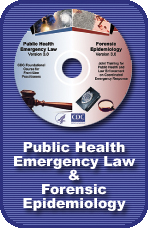
PHLP has released version three of the Public Health Emergency Law and Forensic
Epidemiology training materials on CD-ROM. Please click on the banner
above for more information.

Public Health Grand Rounds
Click on this banner
for more information and archives
|
Profiles in Public Health Law
The business of public health law is not just about "black letter law"-- it
is also about people. In this occasional feature announced in
The CDC Public Health Law News, we briefly profile the people of public health law
-- legal practitioners, lawmakers, judges, teachers, and public health
professionals who use the law in their daily work.
Peter Baldridge (posted August 16, 2005)
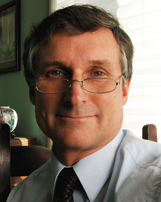 Title: Senior Staff Counsel
Title: Senior Staff Counsel
Organization: California Department of Health Services
Education: B.A., 1975, University of the South; J.D., 1981, McGeorge School of Law
CDC Public Health Law News: What was your route to public health law?
Baldridge: "It was not a straight line. After taking an English degree from the University of the South in Sewanee,
Tennessee in 1975, and spending the next three years as a heavy-duty truck driver, I enrolled at McGeorge School of Law in 1981 in Sacramento.
My intention was to go into labor law, and I had little thought of government service.
But after law school, I went almost directly into state service. I spent a short period of time before that in a private workers compensation
defense practice. My first state job was not in public health. I was on the legal staff of the State Controller, the constitutional officer who
controls the expenditure of state funds. Five years later, I moved to the Department of Health Services in 1987 to work in the area of
environmental law on Proposition 65, an initiative measure passed by the voters the previous year. At that time the environmental community was
having success connecting the public's concerns about potential exposure to low levels of man-made chemicals and public health. Prop. 65 prohibited
discharges of chemicals known to cause cancer or reproductive harm into sources of drinking water and required business to warn people before
exposing them to these chemicals; my job was to implement the initiative measure through regulations. During the six and a half years I worked on
Prop 65, responsibility for its implementation was transferred to the newly-created California Environmental Protection Agency.
So, when I left the Prop. 65 program in 1993 I returned to the Department of Health Services. Again, the work was more in the environmental law
area, licensing a low-level radioactive waste disposal facility to be run by a private company on land that the state would own. It was an interesting
project that ultimately failed for political reasons. So, in 1999 I began working on food and drug issues, and it was while working on those issues
that I was asked to make public health law presentations to public health residents at UC Berkeley. It was the first time I became involved in public
health relating to communicable disease control.
Since that time, I have shifted to a lead role on communicable disease matters, particularly as they pertain to bioterrorism. It was an area I
found myself quite interested in, and it turned out that I had a great grandfather who was the health officer in Huntsville Alabama - he died in 1917 of
pneumonia related to an influenza epidemic. I'm fascinated with the history of epidemics and their ability to cause monumental social changes.
Public health has turned out to be a very comfortable fit for me in the law, and an area that I enjoy working on."
CDC Public Health Law News: Please describe a typical workday.
Baldridge: "I'm now the lead attorney for the Public Health Unit in the Health Department's legal office. Our unit deals with all public health
programs with the exception of radiologic health, so this covers a wide spectrum of issues and topics. And because I'm the lead, I serve as back-up to
every attorney in the unit. Subjects vary greatly: Sometimes I work on Medicaid waiver programs, bioterrorism, and food and drug issues. Some days I'll
spend the entire day responding to public info requests and subpoenas. Other days I'll work on a contract for a TB facility that will double as bioterrorism
isolation facility.
I also spend a lot of time with spring water designations. We have a program for bottled water in the Food and Drug Program. Water needs to be not only safe
to drink but also properly labeled. We get into fights as to what's designated as a 'spring.' It's a journey back to my environmental law background."
CDC Public Health Law News: What is the most important thing you are working on?
Baldridge: "We have some special projects we've been working on. Right now, we're putting together a public health practice guide, which will be
available to local health officers and county counsels as reference resource. Somehow law doesn't seem to be a major element of public health training,
although that's changing and improving. The practice guide is a way of bringing health officials up to speed quickly as to what their duties are with
respect to communicable disease control. County counsels may have no familiarity at all with matters pertaining to public health when they are assigned.
The practice guide should assist them as to where to look for guidance.
I'm also pretty involved in West Nile suppression, getting ready to make some allocations to counties who need it to supplement existing vector control
programs. We've already drafted executive orders for the governor to sign if needed for emergency spraying."
CDC Public Health Law News: Describe any personal information, hobbies, or interests you care to share.
Baldridge : "My primary activity is dance. Mostly the Argentine tango - I teach it in Sacramento. I'm also starting to teach in San Francisco on weekends.
I also take ballet two or three times a week. I got into Argentine tango because of my ballet background: I was asked to teach ballet, and the perk was to take
any other ballroom class I wanted to, so I took Argentine tango.
The other thing that I do is tree climbing, with ropes and harnesses. While I'm up there I usually do some trimming. I started doing that a year ago, after I
trained with people from Atlanta. I also do a little rock climbing with my sons (I have two boys and daughter)."
CDC Public Health Law News: If you were not working in public health law, what would you likely be doing?
Baldridge: "I'd probably be an arborist. I liked being a truck driver but it was too much sitting down. Or I'd be a dance instructor."
CDC Public Health Law News: What are your favorite books and what have you read lately?
Baldridge: "I'm currently reading And the Money Came Rolling In... and Out, a history of the debt crisis in Argentina.
I don't really have lot of time for recreational reading. I wish I did."
CDC Public Health Law News: Is there anything else you'd like to add?
Baldridge: "Regarding lawyers and public health emergencies: Before an emergency we're somewhat useful, during an emergency we're of no use whatsoever, and afterwards we're indispensable."
|
Heather Adams (posted July 12, 2005)
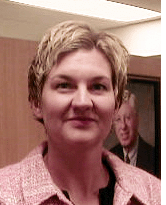 Title: Assistant Attorney General
Title: Assistant Attorney General
Organization: Office of the Iowa Attorney General
Education: B.A., 1991, Luther College; J.D., 1994, University of Iowa College of Law
School
CDC Public Health Law News: What was your route to public health law?
Adams: "My educational
background is a B.A. in 1991 from Luther College, in Decorah Iowa, and a J.D.
from the University of Iowa College of Law in 1994. I work for the Iowa Attorney
General and am legal counsel for the Iowa Department of Public Health. I started
at the AG's Office eleven years ago, and was offered the opportunity to
represent the Department of Public Health about seven years ago. I jumped at the
chance to represent an agency with so many varied and interesting programs – I
represent over 100 different programs, all with important missions. I am amazed
at the breadth and reach of public health – the public tends to think of public
health solely as the provision of health care services to the indigent, but
public health is really the safety net which ensures that the entire population
is healthy. From overseeing newborn screening to investigating communicable
disease outbreaks to preparing for potential acts of bioterrorism, the range is
much broader than people realize, and public health is at the forefront. I love
the quote from C. Everett Koop that ‘health care is vital to all of us some of
the time, but public health is vital to all of us all of the time.’"
CDC Public Health Law News: Please describe a typical workday.
Adams: "Interesting question ... the issues that arise daily are
diverse and challenging. A workday for me might involve a morning meeting with one
of the health professional licensing boards I represent, where legal issues tend to
revolve around profession-specific issues and disciplining licensees for issues like
sexual misconduct or incompetence. Afternoons are usually spent responding to client
queries regarding issues like contracting, statutory interpretation, or drafting administrative
regulations. My job almost always involves significant contact with clients, and I've found
the public health staff I work with and for to be committed and bright, and truly invested in
the health of all Iowans. They are a joy to represent, and not all attorneys can say that about
their clients, I promise you!"
CDC Public Health Law News: What is the most important thing
you are working on?
Adams: "This week I have two top priorities: Finishing a handbook for the Director
of the Department of Public Health, which outlines legal authorities in the event of a public
health disaster. It includes our recently-revised public health disaster law, quarantine law, and
other state laws, and also includes templates for disaster proclamations, quarantine orders, court
petitions and executive orders. We're also burning it to CD, so staff can have it at their disposal,
in event that we have an actual disaster and I'm not accessible.
My second priority involves confidentiality issues regarding the release of information. We're
in the process of redrafting confidentiality laws to better define issues in this area, and clarify
the intersection of federal, state, and case law.
Although my schedule doesn't often allow it, I like projects where I'm more proactive rather than
responding to the fire of the day."
CDC Public Health Law News: Describe any personal information, hobbies, or interests you care to share.
Adams: "I have three small children, ages 7, 4, and 2, so most activities revolve around them.
I've just run my first 20k, and am hoping to complete a sprint triathlon in July.
I also love old houses and reading, and have a small library in our 1920's home, where I can combine both passions."
CDC Public Health Law News: If you were not working in public
health law, what would you like to do?
Adams: "I'd love to run a book store with my husband. We're both really into reading, so being around him and
books all day would be a perfect combination."
CDC Public Health Law News: What are your favorite books and
what have you read lately?
Adams: "I would say that my two favorites are "Stones from the River" by Ursula Hegi, an elegant, beautifully
written novel; and "Prodigal Summer" by Barbara Kingsolver – a must read for anyone with a love of nature. I'm currently reading
"Don't Think of an Elephant" by George Lakoff, a discussion of the role and use of language in politics – a short, interesting
read for summer."
|
Wilfredo Lopez (posted June 28, 2005)
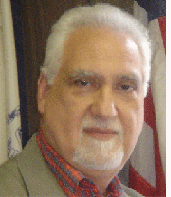 Title: General Counsel for Health
Title: General Counsel for Health
Organization: New York City Department of Health & Mental Hygiene
Education: B.A., 1973, City College of New York; J.D., 1976, Brooklyn Law
School
CDC Public Health Law News: What was your route to public health law?
Lopez: "I graduated from the City College of NY, with a BA in 1973, and from
Brooklyn Law School with a JD in 1976. After doing criminal defense for the
Legal Aid Society in the Bronx and clerking for a Bronx Civil Court judge, I
decided to do something new. In 1979, I started my career in the NYC Department
of Health as a staff attorney, where I liked doing contracts for correctional
health services and methadone treatment programs, and working on regulatory
issues such as radiation control. In 1980, I was promoted to Deputy General
Counsel and was soon immersed in the AIDS epidemic, dealing with legal and
policy issues such as epidemiological investigations involving 'patient 0,'
confidentiality of AIDS and HIV information, and sexual activities in public
places like theaters, baths, and clubs.
The 1990s were also exciting times for public health issues. In 1992, I was
appointed General Counsel to the Department of Health, in the midst of an
epidemic of drug resistant TB. Issues of isolation, quarantine, and public
health detention came to the fore, resulting in amendments to the New York City
health code to provide due process protection to detainees. In 1999, West Nile
Virus highlighted the intersection of public health and environmental protection
laws.
Of course, the attacks on the World Trade Center and the dissemination of
anthrax in the fall of 2001 brought yet another dimension to public health law.
I must say that my route to and through public health law has given me the
opportunity to be involved in some of the most significant social, public health
and legal issues of our age. It's been a fascinating journey."
CDC Public Health Law News: Please describe a typical workday.
Lopez: "Unfortunately, a typical work day now requires a constant struggle to
keep up with email. I say unfortunate because too often the technology allows
for frivolous questions, whereas legal advice needs a more contemplative and
considered approach.
But that is my own pet grievance. Aside from being tied to the computer, most
days involve several meetings with high level policy makers, both inside and
outside the department. What I enjoy the most is discussing live issues with my
legal staff, and providing direction to the lawyers who work with me. I still
enjoy rolling up my sleeves and doing research and writing of opinions, or
drafting a contract, regulation, or piece of legislation."
CDC Public Health Law News: What is the most important thing
you are working on?
Lopez: The most important thing is the updating and thorough revision of the
NYC health code - a project that I've been interested in for years and which
should come to fruition in the next year or so. It's a long process.
The issues presented by the possibility of drug resistant and rapidly
developing strains of HIV, and the world of electronic medical records are also
of great importance."
CDC Public Health Law News: Describe any personal information, hobbies, or interests you care to share.
Lopez: "A lot of 'free' time on weekends is devoted to pushing the lawnmower
and puttering around the house. My wife and I enjoy dancing to Latin music."
CDC Public Health Law News: If you were not working in public
health law, what would you like to do?
Lopez: "That's a hard question, since it's all I've done for over a quarter
century, and I enjoy it so much. I used to think about entertainment law, but my
inner soul still fantasizes about playing percussion (the timbales) in a Latin
band. I exercise that fantasy by banging away on my bongos at home - it's great
therapy."
CDC Public Health Law News: What are your favorite books and
what have you read lately?
Lopez: "I have to say that my favorite book is the one I collaborated on with
many public health colleagues, Law in Public Health Practice. In terms of
everyday reading, I tend toward lighter subjects, like science fiction, although
since the passing of Asimov, the genre just isn't the same. I lean toward
detective stories and murder mysteries - anything to quickly glide me into a nap
on the subway or a good night's sleep."
CDC Public Health Law News: Is there anything else you'd like to add?
Lopez: "One thing I often say is that public health law is just a fascinating
and interesting field of law, and the way I can tell it still holds my interest
is that there's never been a Sunday night or an end of a vacation where I've
said 'oh, shucks, I've got to go to work tomorrow' - I've never had that
feeling."
|
Bobby Pestronk (posted May 17, 2005)
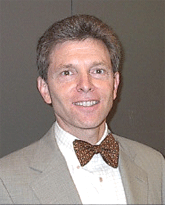 [Editor's note: Mr. Pestronk replied to a set of written questions.]
[Editor's note: Mr. Pestronk replied to a set of written questions.]
Title: Health Officer/Director
Organization: Genesee County Health Department, Flint, MI.
Education: A. B., Princeton University; M.P.H., University of Michigan School of Public Health
CDC Public Health Law News: What was your route to public health law?
Pestronk: "I'm not a lawyer and don't have a career in public health law in the
traditional sense. However, my work swims in a sea of law relating to
regulations, law, authorizations and appropriations at the local, state and
federal levels of government. And staff in the Department work closely
with corporate attorneys on a broad range of contractual, interpretive, and
procedural issues.
The organization I work for, the Genesee County Health Department (GCHD), and
the corporation/local government in which the Health Department is nested, are
both created and specifically authorized by Michigan law. And Michigan's Public
Health Code provides very powerful authorities to the GCHD and its Boards
including, among other things, the authority to create law to protect and
promote the public's health and to take actions to prevent and control epidemics
and events which present imminent threats to the public's health. With
this authority, for example, our local Boards have adopted and authorized
regulations governing water supplies and wells, sewage disposal, tobacco use and
sales, nuisances, inspections, bathing beaches, and swimming pools. To
balance these authorities, we are also bound by a set of administrative rules
and procedures to protect people and businesses who interact with us from
arbitrary and willful behavior on our part. At the service end of our business,
we give law its form and expression by enforcing it and delivering services.
We help people adopt behaviors and make decisions which are consistent with the
law's intent."
CDC Public Health Law News: Please describe a typical workday.
Pestronk: "The scope of work for someone in local governmental public health is
eclectic...and the work I do on a daily basis reflects this. A typical day
involves a crisis of some sort like the loss or gain of funding or staff, a
restaurant closure or food-borne outbreak, loss of power or water or phone
systems at one of the Department's buildings. It typically involves lots
of e-mail traffic with staff, representatives from other organizations, or with
Associations with which I am active, about problems which have arisen and
require some consult, solution, or decision. It involves phone calls from
the media, to gain perspective on a story or to learn about departmental or
extra-departmental situations, from constituents to complement or complain, or
from elected officials to request that the Department examine a specific
situation which has been brought to their attention. There are constant
meetings on a range of personal, behavioral, community, and environmental health
issues with a diverse group of local people. Sometimes there is a brief stop for
lunch either at my desk, at the weekly Rotary meeting, or occasionally at a
restaurant. A typical day includes preparation for meetings, of
agendaeagendas, memos, and reminders to and from staff. Sometimes there is time
for a little bit of reading between meetings and there is always multi-tasking
on a range of longer-range initiatives which get moved along in an incremental
fashion over time. There is always a decision at the end of the day about
what to take home for a closer read and a look at web news before leaving the
office."
CDC Public Health Law News: What is the most important thing
you are working on?
Pestronk: "Improving the public's health requires work with people and paper in a number of
areas simultaneously so there is never only one important issue. As the
director of the Health Department I administer the important work of an
organization of 180 people with a budget of $25 million. Each of these staff
work on an important issue. As health officer I am working to assure
access to primary care for about 30,000 County residents through a local
non-profit organization, beginning to work with a consultant to consider ways in
which the emergency medical services system in the County might be reorganized
and the services delivered differently, and finishing a phase of activity which
will result in the redesign of the County's medical examiner system. I'm
also working with State legislators and others in the community to try to
prevent the loss of state funds for hearing and vision screening services now
delivered by the Department to school age children. Finally, I am also working
with the National Association of County and City Health Officials on two
projects: the first to better profile characteristics of local health
departments and those who work for, and with, them; the second to implement a
recognition program for local health departments who have met standards and
criteria which demonstrate preparedness for emergencies. I've also helped
to create the Public Health Law Association, an international organization which
promotes healthy people in healthy communities through dialogue, partnerships,
education and research in public health law."
CDC Public Health Law News: Describe any personal information, hobbies, or interests you care to share.
Pestronk: "My wife and I are taking ballroom dance lessons...something which has
been on our to-do list for a long time and is finally getting attention. I
spend time on my vegetable and perennial gardens from Spring to the Fall and of
course push a lawnmower around at least once a weekend from May through
November. I either run or skip rope in the mornings and lift weights in
the evening. I dabble periodically on steel string guitar usually getting
distracted by other things just about the time I feel like I'm making some
progress. My son is just finishing college and my daughter finishing her
first year in college. I've really enjoyed being with them as they have
grown into very talented and responsible young adults. And this time of
the year I'm trying to watch the Detroit Pistons win another championship."
CDC Public Health Law News: If you were not working in public
health law, what would you like to do?
Pestronk: "A professional surfer or lead guitar in a rock or jazz band."
CDC Public Health Law News: What are your favorite books and
what have you read lately?
Pestronk: "Most recent book read: The Rule of Four.
Reading now: Hard Times by Dickens; a collection of short stories, Telling
Tales; and whatever in the current issue of the New Yorker magazine peaks my
curiosity."
|
Sandy Keating (posted April 19, 2005)
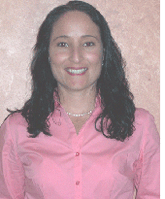 Title: Legal Services Officer
Title: Legal Services Officer
Organization: Georgia Department of Human Resources, Division of Public Health.
Education: University of Miami, political science, 1995. JD: Emory University School of
Law, 1998.
CDC Public Health Law News: What was your route to public health law?
Keating: "I have been at the Division of Public
Health for two and a half years. Out of law school, I started as a staff
attorney for the Georgia Council of Juvenile Court Judges, a state judicial
branch agency that serves as a representative body of all juvenile courts in
Georgia. As a staff attorney, I handled legal issues facing any judge in
the state on a particular day; foster children, children with special needs,
etc. I realized that providing services to children that are in their best
interest was a multi-agency team effort with a lot of cross-section between the
Division of Family and Children Services, Public Health, and the Department of
Education. That was my first introduction to the vital role of public
health, and I became interested in it. Ultimately, I left the courts to accept
this job in public health - a move that my family appreciated. My mother
is a nurse, and my twin sister is a physician so I wanted to do something in the
medical field. I realized that the field of public health probably offered
the most effective way to work in the fields of law and medicine and still be in
the public sector."
CDC Public Health Law News: Please describe a typical workday.
Keating: "There is no typical workload. A typical
day is extremely fast paced, and the priorities of the day are based on whatever
situation confronts our public health staff that are in the community. I
don't drive the priorities; they are based on the needs of the community.
We react to that and provide legal guidance. For example, this morning my
work includes providing guidance on whether there is legal justification to
grant a waiver to our environmental health rules and regulations. Another
issue centers on whether Public Health has the legal authority to enter into
rental property to conduct an environmental investigation to check lead levels
in that home. Another task is determining what legal tools Public Health
can use to ensure more consistent notifiable disease reporting from health care
providers. Later this afternoon, I'm looking at Public Health's authority
to access school records to determine whether children are getting proper
hearing screenings, and I will also be completing a progress report on the
assessment of our public health laws and whether they are sufficient to enable
Public Health to respond effectively to an emergency. It's a dynamic
workplace that requires flexibility. I appreciate the fast pace and that
it's event-driven."
CDC Public Health Law News: What is the most important thing
you are working on?
Keating: "Every program is so
important and carries out vital functions, and each has reason to feel its work
is the most important. In the past legislative session, Public Health
passed its Tuberculosis (TB) bill. It revises GA statutes to lengthen the
amount of time that Public Health can confine TB patients who persistently do
not adhere to treatment. The current statute only allows confinement for up to
six months, while CDC recommendations suggest that a patient with multi-drug
resistant TB be confined for a minimum of 18 to 24 months for adequate
treatment. Public Health asked to lengthen the time to two years to meet
the CDC recommended timeframe. The change was just passed by the
legislature, and I have been answering questions from the Governor's office
about this change. I have also been working with TB program staff to
provide information to address any concerns. We hope the Governor will
sign SB 56 into law.
A long-term priority is the work being done by our state isolation and
quarantine work group; the group has been in existence for two years. In
2002, the Georgia legislature required Public Health to create rules and
regulations for quarantine and isolation during a public health emergency.
The work group was created because policies and procedures have to be in place
before adopting these rules and regulations. The group includes different
professionals in public health, including health directors, nurses, hospital
administrators, physicians, epidemiologists, etc. We created working
drafts for voluntary agreements and draft orders for health officers. This
work is a priority because it's important to have a formal process in place for
restrictive measures like quarantine and isolation that gives public health
officials clear authority to act during a public health emergency; it's equally
important to have this in place to insure that the public's due process rights
are protected during such a time."
CDC Public Health Law News: If you were not working in public
health law, what would you like to do?
Keating: "I
would probably be working in federal law enforcement. I have always been
interested in that field. I did an internship with the general counsel's
office at the ATF during law school. Since 9/11, a lot of public health
includes providing legal guidance on public health emergency laws, the
Governor's emergency powers, preparation and response. In doing that work,
I come into contact with local, state, and federal law enforcement officials.
So going into federal law enforcement would be a natural career progression for
me."
CDC Public Health Law News: What are your favorite books and
what have you read lately?
Keating: "To Kill a Mockingbird, by Harper Lee. I
feel that Atticus Finch is one of the most courageous lawyer characters in
literature. The book's main message is that everyone should be considered
equal under the law regardless of race. When Finch addresses the jury, he
makes a moving oratory on this point, 'The defendant is not guilty, but someone
in this courtroom is....' It's a very effective indictment against racism
in the court room. I am currently reading The Games Do Count,
by Brian Kilmeade of Fox News. The book profiles different public figures,
and talks about the role that sports played in their lives. I've played
sports my entire life and I believe that sports provide a great avenue to build
character, leadership, and respect. The book allows you to see a side of
public figures such as Condoleeza Rice and Jack Welch that you wouldn't
otherwise have an opportunity to see."
|
Robert E. Ragland (posted March 23, 2005)
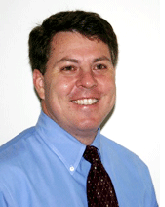 Title: Senior Deputy County Counsel
Title: Senior Deputy County Counsel
Organization: Office of the County Counsel, Los
Angeles County, California
Education: B.A., 1989, University of California Santa
Barbara (History); J.D., 1994, Southwestern University School of Law
CDC Public Health Law News: What was your
route to public health law?
Ragland: "My journey as an attorney took many different paths before I
ended up where I am today. I passed the bar exam and started with the
County of Los Angeles about 10 years ago, and my first assignment was to
represent the County's Department of Children and Family Services in juvenile
dependency court. After three years in that assignment, I transferred to
my office's General Litigation division, and represented well-known county departments like the Sheriff and the Coroner ("coroner to the stars") in various
types of litigation. Then, after three years, in 2001, I transferred to
our Public Services Division where I thought I would concentrate on representing
the county's five hospitals. But there I began my practice of public
health law. I started by representing the county's Alcohol and Drug
Program Administration, and was later assigned the Tuberculosis Control Program.
That was my main route into my current role -- representing the county's Public
Health Department, including its Acute Communicable Disease Control and
Environmental Health programs. After 9/11, I also volunteered to represent
the county's Bioterrorism Preparedness Program, which cemented my commitment to
the practice of this area of law."
CDC Public Health Law News: Please describe a typical workday.
Ragland: "There is no typical day at the office because the need for
legal advice is event-driven. Many times, especially in disease control
matters, the client wants to know what they can or cannot do, right then.
Because I am relatively new to the practice, I face many of these issues for the
first time. Recent issues that have confronted our county's public
health department range from the confidentiality of reports of hospital acquired
infections to a distemper outbreak among horses in a rural part of the county.
Other various issues that I worked on in the past year have been: how to best
treat an infectious MDR TB patient that would not stay in his hospital room; the
effect of the Compassionate Use Act (medical marijuana) on the county's
Department of Health Services; and what type of license is required to drill a
water well in California. So, in my practice, there is a wide variety of
issues that sometimes need immediate answers, which is more than enough to keep
me busy."
CDC Public Health Law News: What is the most important thing
you are working on?
Ragland: "I think the most important thing I do is to advise the local
health officer and his staff on his powers and duties to control the spread of
diseases within the county. Simply put, I advise them on what they can and
cannot do."
CDC Public Health Law News: If you were not working in public
health law, what would you like to do?
Ragland: "If I were not doing this, I likely would have eventually
matriculated into one of three things: a bartender, a basketball coach, or a
writer. Of course, everyone in LA has screenplay to pitch."
CDC Public Health Law News: What are your favorite books and
what have you read lately?
Ragland: "The Hunchback of Notre Dame, by Victor Hugo, or A Confederacy of
Dunces, by John Kennedy Toole. The book I have read most recently was Life on
the Mississippi, by Mark Twain. It contains a passage describing the effects
of a yellow fever outbreak in a town in Missouri".
Quote by Robert E. Ragland: "In my job, you gain an appreciation for the real
interdependencies of community, and how public health law touches, either
directly or tangentially, every aspect of people's lives. I do think
it is important to remember that it is the goal of a community to strive
for the good of its members, which clearly includes the public's health."
|
Disclaimer: Non-federal links and content at this site are
provided solely as a service to users. These links and content do not
constitute an endorsement of non-federal organizations or their programs by CDC
or the federal government, and none should be inferred. CDC and the federal
government assume no responsibility for any non-federal content on this site, or
linked to this site. Legal forms and references are provided solely as a
convenience to user and should be used only under the guidance of a
knowledgeable attorney in the jurisdiction in which they originated. The
materials presented at this site are not meant to be exhaustive, nor do they
constitute legal advice.
|


